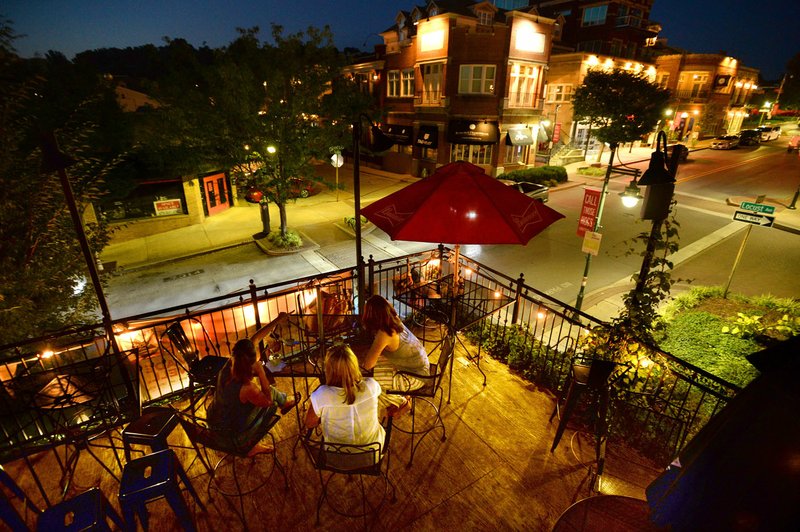Alcohol affects perception. It seems it may be influencing ours as we consider the future of "entertainment districts" in Arkansas.
No, we haven't dipped into the sauce to get the creative editorial-writing juices flowing. But as the City Council in Fayetteville weighs establishing a downtown district to allow drinking alcoholic beverages outdoors, on public sidewalks and closed public streets, the way this has developed has us questioning whether what we're seeing is real.
What’s the point?
Fayetteville’s moderate approach to allowing public consumption of alcohol in specific areas of town is a good start that can be adjusted as time goes by.
First, did the state legislation to liberalize the way some cities can allow for public consumption of alcoholic beverages really come from state Sen. Trent Garner of El Dorado, a political figure known for rather conservative positions on, well, just about everything? His sponsorship drew criticism from the conservative Family Council, which suggested public drunkenness is sure to follow.
It also feels like we need to shake some fogginess out of our heads when it appears Fayetteville is taking a more conservative approach to expanding public consumption of alcohol than Mountain Home, Little Rock and Garner's own El Dorado. All three towns have already adopted entertainment districts with regular days and hours each week where outdoor drinking will be part of the festivities.
Little Rock's district, for example, launched Friday at 5 p.m. in the River Market District downtown. That district has standing authorization to allow for open cups of alcohol, sold by establishments within the district, on Friday and Saturday nights, Sunday afternoons and on select holidays.
Mountain Home's district, comprising about eight blocks, will allow outdoor consumption daily from 4:30 p.m. to midnight within the restricted space.
Fayetteville, where the City Council took up debate on an ordinance for the first time last Tuesday, proposes a far bigger entertainment district. It runs as far north as Maple Street to beyond Martin Luther King Jr. Boulevard on the south, and from the University of Arkansas campus boundary west to just beyond College Avenue.
That may not sound more conservative, but the way the city will authorize public consumption of alcohol within those boundaries really is, and wisely so.
As proposed, Fayetteville's ordinance will give the mayor authority to receive and approve permit requests identifying which portion of the entertainment district an event organizer wants to "activate" for public drinking of alcoholic beverages and for how long. According to the proposed ordinance, public streets within the designated areas where drinking is allowed must be closed to "vehicular traffic." Whether that includes the rent-a-bike or rent-a-scooter programs operating downtown isn't spelled out.
The ordinance spells out other conditions, such as: (1) use of compostable or reusable cups bearing a name or logo of the event organizer or one assigned by the city of Fayetteville; (2) customers will have to wear an approved wristband or other identifier as a means to help police spot illegal (i.e., under-age) drinking of alcohol; (3) alcoholic beverages from outside the district -- in cans, bottles or glass containers -- will be prohibited; (4) no person can enter a business licensed to sell alcohol with alcohol purchased at another business; (5) operators of businesses not licensed to serve alcohol can choose whether to allow or disallow alcoholic beverages sold within the district into their establishments.
Fayetteville's district, as proposed, includes no standing authorization for outdoor drinking anywhere. No, city leaders do not envision, at least so far, Dickson Street becoming a replica of Memphis' Beale Street or New Orleans' Bourbon Street.
"One reason we're doing it differently is because we have a very large college-aged population," said City Attorney Kit Williams, whose office has worked with Mayor Lioneld Jordan's staff to draft the proposed ordinance. "I think we want to walk into this as carefully as possible."
So far, it seems the public is comfortable with the concept. Nobody from the public addressed the City Council last Tuesday on the measure. But City Council members, who debated wording over wristbands for probably 30 minutes, encouraged the mayor to get more input from businesses most likely to be affected by the new approach to alcohol. That's wise advice to ensure this isn't just government dictate. Let the businesses offer their expertise so that implementation doesn't become a burden.
Start small seems to be the mantra. Closing city streets wherever an event activates outdoor drinking is a smart move as the community gets comfortable with this new wrinkle in civic life.
Williams said it will be far easier to expand the approach later, if the city deems it appropriate, than to rein it in after going too far.
There certainly may be a desire among some city officials to establish Dickson Street as an outdoor drinking venue with regular days and hours, but this ordinance reflects that city's leaders aren't ready for that yet.
Taking it slow will give Fayetteville and the other cities a chance to learn from each other's experiences. Hot Springs, Texarkana and Bentonville are looking into entertainment districts and how they might fit with those towns.
Ultimately, if done well and with moderation, the new approach to alcohol consumption in public needs to ultimately be an small enhancement to life in Fayetteville and the other cities, but not a dominant presence. Using Fayetteville as an example, the city has so many great features, with more on the way, that make it worth visiting and worth living in. The availability of alcohol certainly is an amenity, but it should not become a defining attribute.
The ample flexibility in Fayetteville's district is a good start.
Commentary on 08/25/2019

